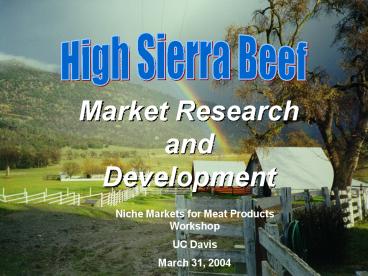Market Research PowerPoint PPT Presentation
1 / 23
Title: Market Research
1
High Sierra Beef
- Market Research
- and
- Development
Niche Markets for Meat Products Workshop UC
Davis March 31, 2004
2
High Sierra Beef Overview
- Background
- Market Overview
- High Sierra Beefs Market Research
- Customers versus Consumers
- High Sierra Beefs Markets
- Product Development and Carcass Value
- The HSB Team
- Next Steps
- Questions
3
Background
- Ranching families from our 6 county region met in
2001 to discuss opportunities for marketing local
beef. - Our initial focus was on turning culinary cows
into ground beef. - High Sierra RCD and UCCE obtained grant funding
to evaluate the feasibility of marketing locally
and to develop a business plan.
4
Market Overview
- What others are saying
- Lee Arst, former CEO of Coleman Natural Beef
- The natural beef market is currently worth
approximately 350 million in annual sales. The
market will grow to 1 billion in annual sales
(about 2 percent of total beef sales). - Consumer perceptions about food safety afford
natural beef programs a large marketing
opportunity there is not currently enough
product to satisfy this interest.
2003 Niche Markets for Meat Products Short Course
5
Market Overview
- What others are saying
- Dr. Gary Smith, Colorado State University
- Story beef is the wave of the future.
- The most important consumer motivations for
purchasing natural beef are - Hormone free
- Ranch name
- Antibiotic free
- Cattle are not fed meat byproducts
- Animal care
- Environmental stewardship
Chico Beef Day 2004
6
Market Overview
- What others are saying
- Laurie Demeritt, Hartman Group
- The hottest new food trend is the wellness
consumer. - Consumers two biggest concerns in meat are
antibiotics and artificial hormones. - Consumers want meat with stronger flavor and more
variety. - Consumers want meat to have health benefits and
to be guaranteed tender.
Stockman Grassfarmer, March 2004
7
High Sierra BeefsMarket Research
- Conducted survey of 29 restaurants, retailers and
institutional buyers to determine key motivations
for purchasing beef. - Collected consumer surveys from approximately 200
consumers during tasting events - Gold Country Fair (Auburn)
- Taste of the Gold Country (Grass Valley)
- Placer Land Trust Harvest Dinner (Auburn)
- North American Farmers Direct Marketing
Association Dinner (Roseville) - Used volunteers to conduct surveys
8
(No Transcript)
9
Key Attributes - Retail/Restaurant
10
Key Attributes - Consumers
11
Key Attributes - Comparison
12
Key Attributes - Conclusions
- Beef must have certain attributes before the
story has value - Flavor
- Tenderness
- Food safety
- Consistency
- Locally produced, grassfed beef is far more
important to consumers than retailers and
restaurateurs realize! - Natural beef is more important to consumers.
- Consumers do choose beef for its nutritional
value (more so than retailers and restaurateurs
realize)
13
Customers versus Consumers
- Customers are the individuals or businesses who
buy your product - Restaurants
- Retailers
- Institutional users
- Consumers are the individuals who eat your
product - May also be customers
- Customers are the key to your marketing strategy
you must convince customers to buy your
product! - Consumers can create demand for your product and
can help convince customers to carry it.
14
High Sierra Beef Markets
- Geographic focus San Francisco Bay Area
(including Napa and Monterey), Sacramento Metro
Area, High Sierra region, and Reno/Tahoe.
15
High Sierra Beef Markets
- Products will be marketed through upscale
restaurants, specialty retailers, high-end
institutional markets, and the internet. - Products will include steaks, roasts, premium
ground beef, and a variety of value-added
products (including beef sticks, jerky, lunch
meats, sausage, case ready products, etc.)
16
Product Development and Carcass Value
- Carcass yield and retail cut-out are critical to
determining carcass value! - How much of each cut (or product) will you have
in each carcass? - What factors influence yield and retail cut-out?
- Product development should maximize total carcass
value.
17
Retail Value
18
Who Is On the HSB Team?
- The 12-member Executive Board and 50-member
Steering Committee are composed of ranchers who
are potential investors and participants in the
HSB program. They bring real-world perspective to
the project team and give HSB a producer
foundation to start the business.
19
Who Is On the HSB Team?
- Dan Macon, High Sierra Resource Conservation and
Development Council - Roger Ingram, University of California
Cooperative Extension Farm Advisor - Terry Jochim, High Sierra Beef Project Manager
- Doug Freeman, Sierra College Small Business
Development Center
20
Who Else Is Needed on the HSB Team?
- Marketing Consultant
- Product Development Consultant
- CEO
- Marketing and Sales Expert
- Field Representative
- Administrative Staff
21
Where does High Sierra Beef go from here?
- We are currently conducting market research to
determine the size and value of High Sierra
Beefs potential market. - Critical to attracting outside investors!
- We will be developing a suite of products
designed to meet customer needs and maximize
carcass value. - We will be evaluating how we match customer needs
with consumer desires.
22
Where does High Sierra Beef go from here?
- Developing strategies for reaching each
identified market sector. - Finding transportation, processing and
distribution partners. - Planning to begin product development and test
marketing activities in Fall 2004. - High Sierra Beef will complete its marketing,
business and financial plan by Fall 2004. - Anticipate product roll-out in Spring 2005.
23
Questions?

